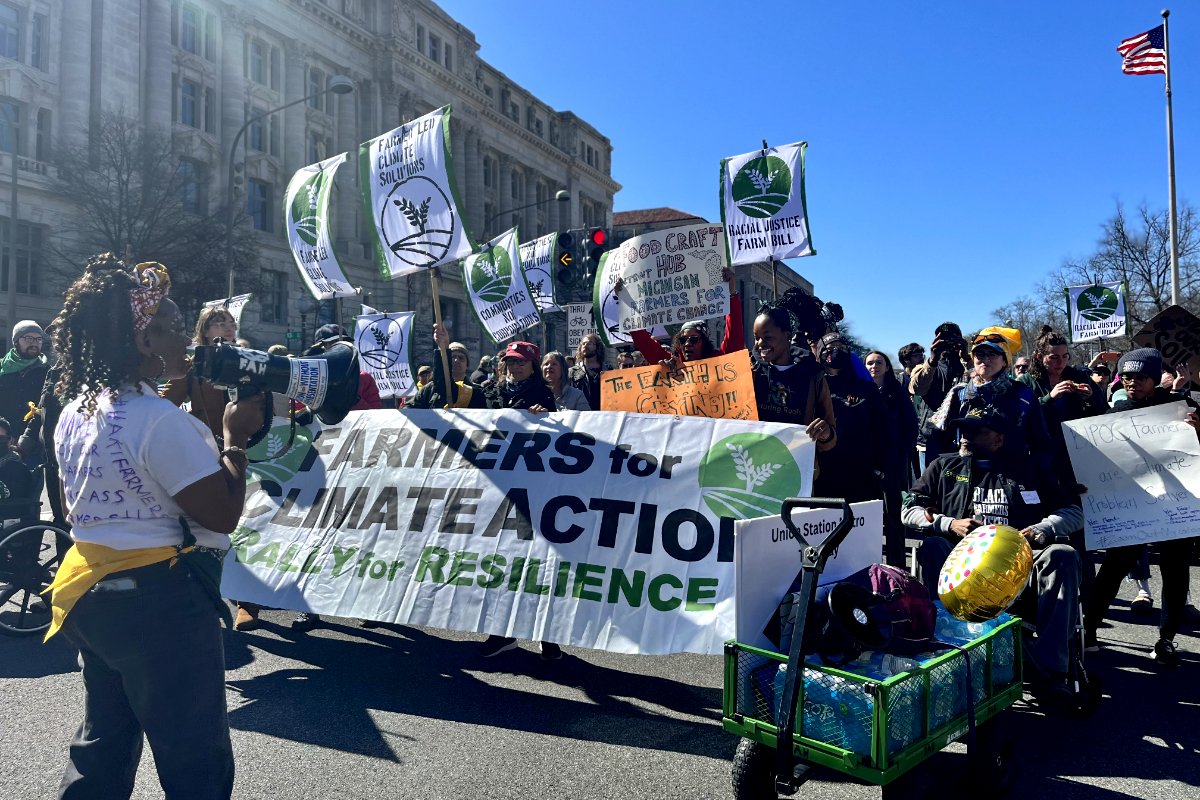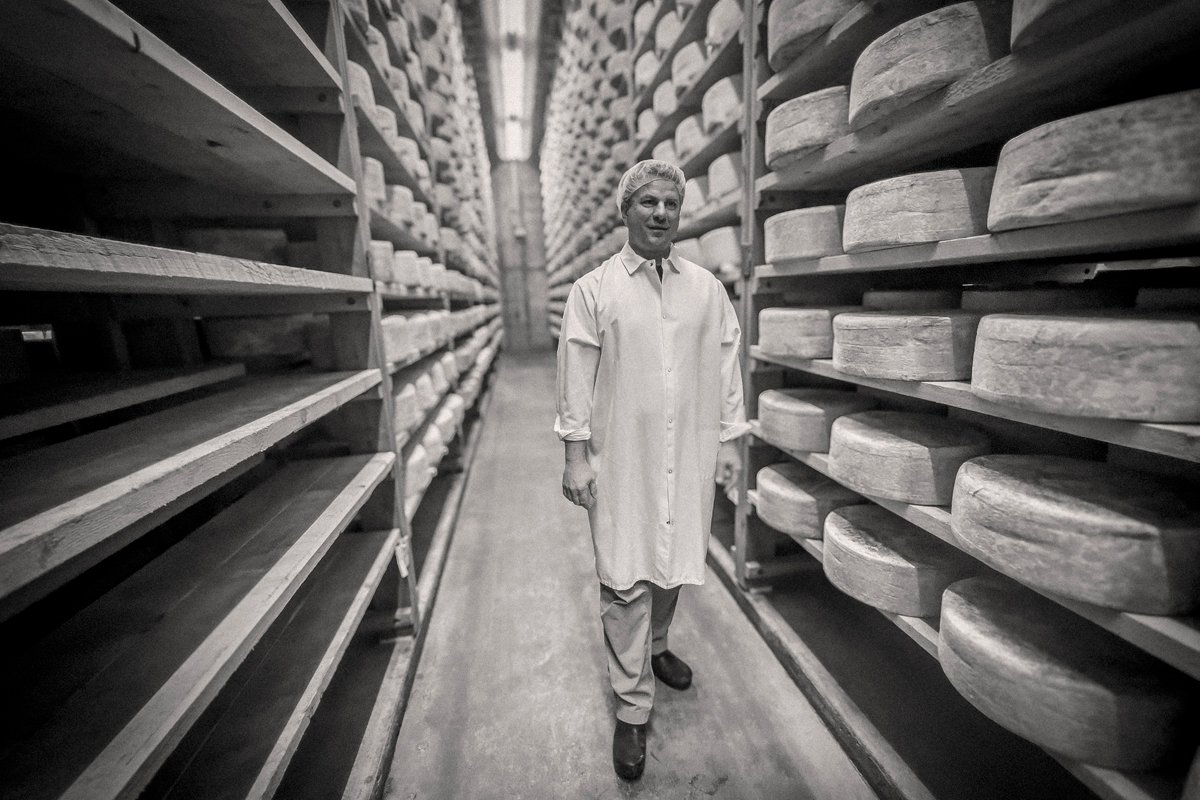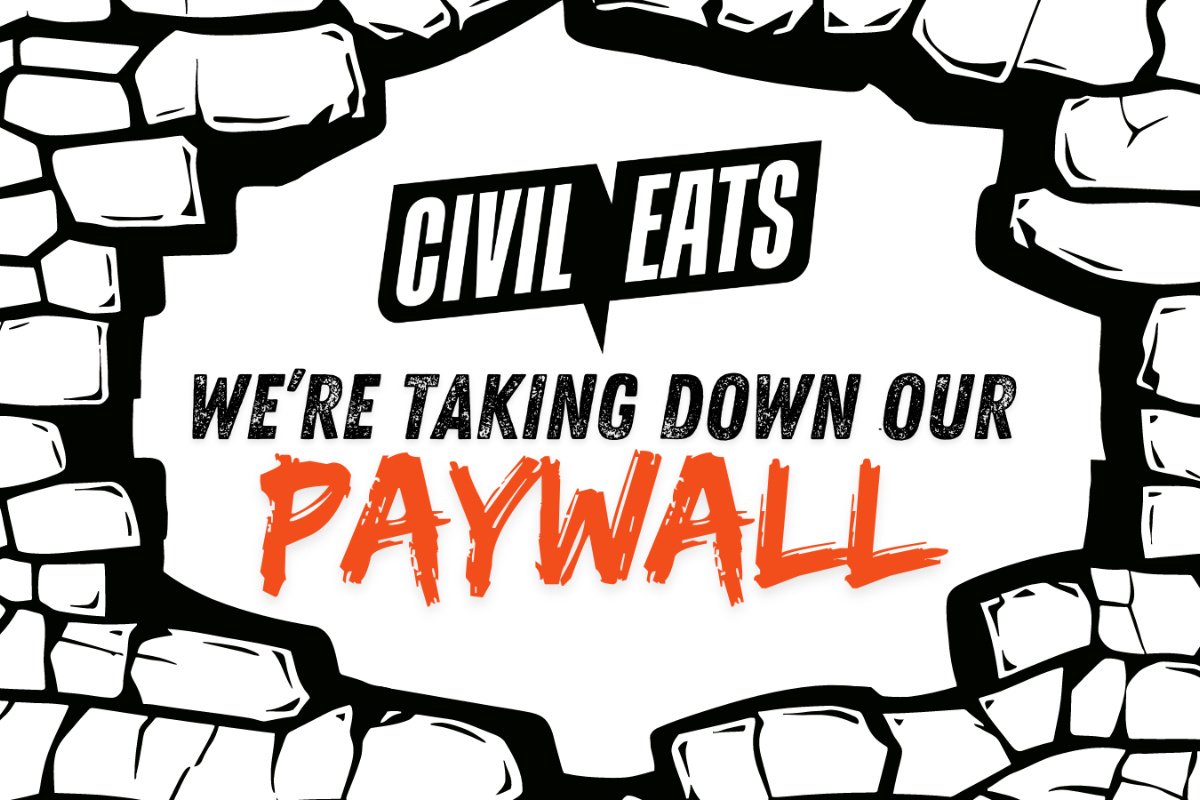In this week’s Field Report, scenes from the Rally for Resilience, a push for “Product of USA” labeling on meat, new glyphosate research, and more.

In this week’s Field Report, scenes from the Rally for Resilience, a push for “Product of USA” labeling on meat, new glyphosate research, and more.
March 9, 2023

The Rally for Resilience marches to the U.S. Capitol building. Signs at the front read “Farmer-led climate solutions” and “Racial justice farm bill.” (Photo by Lisa Held)
Agrarian movements in the U.S. are rooted in a storied history. Enslaved Black people who were forced to work in cotton and other fields revolted over 100 times between the 17th and 19th century. Exploited California farmworkers went on strike and unionized in the 1960s. And farmers faced with economic ruin during the Farm Crisis of the late 1970s and early ‘80s drove their tractors to Washington, D.C. to demand fair prices.
This week, another nascent movement appeared to be coalescing at Freedom Plaza, just steps from the White House. There, farmers and their advocates gathered to bring attention to the urgency of the climate crisis at what they called the Rally for Resilience.
It was one part of a larger effort to meet an important moment. With the country’s biggest piece of farm legislation set to be reauthorized this year, 24 organizations—including the HEAL Food Alliance, the National Sustainable Agriculture Coalition (NSAC), and Rural Advancement Foundation International (RAFI-USA)—joined together to organize three days of action in the nation’s capital.
A few hundred farmers and allies attended, and the crowd was diverse in every way: Indigenous and Black, urban and rural, organic and regenerative, farmers and farmworkers. At a time when many farmers are aging out of the occupation, the bulk of U.S. farmland is owned by a shrinking number of people, and the question of who will grow food here in the coming years looms large, many were also notably young.
“Some of us wondered, ‘Who’s gonna continue the fight?’” said David Senter, who in 1979 spent 15 days driving his tractor to D.C. from Texas to demand parity for farmers. Senter was back this week to represent the Farm Aid generation. From the stage, he said he was thrilled by the faces in the crowd and their commitment to farming and environmental stewardship. “I pledge my support to all of you young people,” he said. (Stalwart farmer advocates John Mellencamp and Willie Nelson also showed up to offer support—Mellencamp on stage and Nelson via video.)
The rally was officially focused on climate action, but a mark of this particular movement is a broader recognition of the unequal impacts of the climate crisis and the fact that the policy solutions on the table could easily bypass groups without mainstream agricultural power. Farmers held signs that said “Less oil, more soil,” as well as “Black food sovereignty now” and “Communities over corporations.”
“For generations, corporations and Big Ag have seen us a source of labor and not as the farmers,” said Julieta Saucedo, a small-scale farmer from El Paso, Texas, as she talked about the agroecological farm and land stewardship practices passed down in her family. “The relationship we build with soil dictates the future of our food systems for generations.”
As the farmers prepared to march to the Capitol building and then to meet with legislators to talk about the farm bill the following day, it was clear that although they will face significant challenges in moving their agenda forward, they are beginning to build strength in numbers—just as their ancestors did. As Navajo Nation farmer Chili Yazzie said, “Farmers are tough, but Mother Nature’s tougher.”
Below, we present scenes from the Farmers for Climate Action: Rally for Resilience.
Where’s the Beef (from)? After several years of rancher and consumer-group advocacy, this week, the U.S. Department of Agriculture (USDA) proposed new regulations that would only allow meat “derived from animals born, raised, slaughtered, and processed in the U.S. to be labeled “Product of USA.”
Currently, sellers can use that label if they package meat in the country, even if the animals came from elsewhere. Since production costs are higher in the U.S., ranchers have long argued that fact undermined their ability to get fair prices. Last year, in an executive order, President Biden promised his administration would address Product of USA labeling as one piece of a larger plan to increase competition in the meat industry and level the playing field for struggling farmers and ranchers.
“Truthful labels protect consumers and keep the playing field fair,” said Joe Maxwell, president and co-founder of Farm Action, in response to the proposed rule, which will soon be open for comments before being finalized. “After a five-year fight, we’re pleased to see the USDA stepping up to stop the cheaters picking the pockets of America’s farmers and ranchers.”
Other groups including the American Grassfed Association, National Farmers Union, Consumer Reports, and the American Economic Liberties Project praised the move. But the rancher group R-CALF USA, which has been doggedly pushing for labeling, said the rule would not going far enough, because the requirements won’t be legally binding or come with enforcement.
Instead, the group wants Congress to reinstate what is called “mandatory country of origin” labeling, which would require all meat sellers to identify the country the product came from on the label. “R-CALF USA remains steadfast that only under legislative reform will effective change happen,” the group said in a press release. Meanwhile, the meat industry’s biggest trade group said the new rules would likely violate trade agreements and raise prices for consumers.
In conjunction with the release of the Product of USA rule, the USDA also released a report on consolidation in the seed industry and proposed several steps it will take to improve seed pricing, choice, and availability.
Read More:
With Their Livelihoods Under Threat, Livestock Producers Pin Their Hopes on Labeling
Just a Few Companies Control the Meat Industry. Can a New Approach to Monopolies Level the Playing Field?
Roundup Risks. Last week, researchers at U.C. Berkeley’s School of Public Health published a new study showing early childhood exposure to glyphosate is associated with a higher risk of liver inflammation and metabolic disorders in early adulthood. Data in the study came from the Center for the Health Assessment of Mothers and Children of Salinas (CHAMACOS), a project that has been tracking how pesticides impact the health of farmworker children in the Salinas Valley, the center of California’s agricultural industry, since 1999. Farmworkers bear the brunt of pesticide exposure, since they are exposed in the fields and often live near farms.
Glyphosate is the world’s most common weedkiller and is used in fields and on lawns across the country. Increasing attention to its impacts on human health over the last decade has primarily been focused on its carcinogenic potential to cause cancers like lymphoma. This is the first study to look at its impact on metabolic and liver disease, which are increasing among children and can lead to liver cancer, diabetes, and cardiovascular disease later in life.
Read More:
Inside Monsanto’s Day in Court: Scientists Weigh in on Glyphosate’s Cancer Risks
Why Aren’t Federal Agencies Enforcing Pesticide Rules That Protect Farmworkers?
Pahokee to Palm Beach. Farmworkers and allies with the Coalition for Immokalee Workers (CIW) in Florida announced that they will march across Florida for five days next week to celebrate a decade of success while also pressuring more companies to sign on to their groundbreaking Fair Food Program. “If the stark contrast between the humane conditions on Fair Food Program farms and the harsh conditions on farms beyond the Program’s protections has taught us anything, it’s that farm labor abuse is a horrible problem, but it’s a problem with a simple solution: Join the Fair Food program,” said Lucas Benitez, a Co-founder of CIW.
Created 10 years ago, the program has been credited with markedly improving conditions in agricultural fields for workers on the East Coast, including reducing the instances of sexual assault and improving wages and working conditions. Its organizers have made great strides in getting agricultural employers and policymakers to engage with their demands. Last week, CIW representative Lupe Gonzalo participated in a panel on farm labor at the USDA’s Agricultural Outlook Forum, marking the first time a farmworker was given the opportunity to speak to the exploitation they often face on farms at the agency’s most important annual gathering.
Still, some companies have refused to sign on, and the group is continuing to pressure Wendy’s, one of its longest holdouts, as well as Publix and Kroger.
Read More:
Florida’s Farmworkers Take Their Fight to Park Avenue
After #MeToo, This Group Has Nearly Erased Sexual Harassment in Farm Fields

September 4, 2024
By paying top dollar for milk and sourcing within 15 miles of its creamery, Jasper Hill supports an entire community.
September 3, 2024

August 27, 2024

August 26, 2024

Like the story?
Join the conversation.